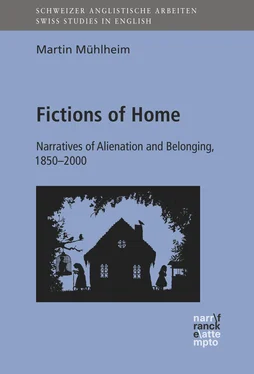Importantly, the novel’s exploration of social prejudice is paralleled by a searching critique of literary conventionsconventions, styles, and genres – including the BildungsromanBildungsroman (or novel of formation), the use of ironyirony and nostalgianostalgia, and the vicissitudes of tragic theory in its Aristotelian form. In relating such stylistic and generic inquiries to the material problems of home and belonging, Eliot’s novel suggests that literary culture ought not be imagined as a rarefied aestheticaesthetic realm that can be understood in isolationisolation from ideological and political struggles. The novel thus rejects any clear-cut separation between social and discursive modes of dispossession. Highlighting instead that discoursediscourse itself is a material product of social relations, The Mill on the Floss intimates that the quest for a just and inclusive society depends, at least in part, on a communitycommunity’s repertoire of fictions of home. In doing so, it focuses less on the problem of transcendental homelessnesstranscendental homelessness, and more on the role of societal forces in determining the limits of our freedomfreedom to belong.
Home and the BildungsromanBildungsroman
Critics have long discussed The Mill on the Floss as a novel of formation or BildungsromanBildungsroman (e.g. Buckley 97 and Jost 106) , and of all novelistic genres the Bildungsroman is perhaps most inextricably intertwined with the question of home. Home is, for instance, quite literally the genregenre’s starting point:
[T]he hero sets out from home in order to travel and see the world, and records his right and wrong turns. He falls in lovelove, and has his first sexual experiences before finding, and eventually marrying, his ideal companion. He thus gains knowledgeknowledge of the world, and his experiences modify his Weltanschauung . (Gemmeke 32)
Leaving his childhoodchildhood home, the (male) protagonist will have to learn the ways of the world, and this experience will ultimately turn him into a mature and useful individual richly deserving of domestic bliss. By the end of his quest, the hero will, in other words, have learnt to reconcile his individual desires with the demands of society: “[E]xperiencing both defeats and triumphs, [he] comes to a better understanding of selfself and to a generally affirmative view of the world” (Hardin xiii). Indeed, as Franco MorettiMoretti, Franco points out, in the process of true BildungBildung the hero fuses external compulsioncompulsion and internal impulses “into a new unity until the former is no longer distinguishable from the latter” ( Way of the World 16). Desire and duty may jar at first, but any such discord will eventually be dissolved.
The only reason why such a dialecticaldialectic fusion of societal imperatives and individual desiredesire is conceivable is that the genregenre envisages BildungBildung itself as a kind of homecoming:
[I]n BildungBildung one gives oneself over to something other than oneself, and by this process of giving over, becomes more fully oneself. Giving oneself over to something other is a going out to the other, so that Bildung involves the notion of leaving home […] and going out into a new place that is strange and unfamiliar. As one comes to understand this other place, as it becomes familiarfamiliarity, it comes to be a new home . […] It seemed strange simply because we did not recognise ourselves in it. (Coyne and Snodgrass 224; emphasis added)
BildungBildung allows the protagonist to recognize himself in what at first seemed an alien world, and the prototypical BildungsromanBildungsroman narrativizes the “dialecticaldialectic harmonyharmony” of such an experience of homecoming (CastleCastle, Gregory 8; see also LukácsLukács, Georg 138; Slaughter 111). As harmony is the key term in the ideal version of Bildung , the hero’s ultimate acceptance of society’s demands must never be motivated by compulsioncompulsion, fear, or disillusionment, but instead ought to result from his genuine identification with society’s normsnorms (MorettiMoretti, Franco, Way of the World 16).
Many critics recognize, however, that in practice the genregenre often falls short of this haromonic ideal, as witnessed by the many classic Bildungsromane that end neither in joyous affirmation nor with calm acceptance, but rather on a note of reluctant, at times painful, compromisecompromise. Indeed, for some critics, the genre’s historical development follows a downward trajectory from early optimism to increasing gloom. Franco MorettiMoretti, Franco, for instance, posits that the truly optimistic phase of the genre, with its “beautiful balance” between the benefits and constraints of modern socialization, lasted only until the mid-nineteenth century, when “the atmosphere darkens” ( Way of the World vi – vii). The case of Great Expectations (1860–1861) arguably constitutes a good example of this increasingly ambivalentambivalence atmosphere, as DickensDickens, Charles famously wrote two markedly different endings for his novel: a first one, where the protagonist’s desiredesire for his beloved remains forever unfulfilled (481–482); and a second version, where Pip can finally clasp Estella’s hand, seeing “the shadow of no parting from her” (480; ch. 20). DickensDickens, Charles’s first instinct was, in other words, to end on a pessimistic note, and it took a conscious effort of authorial revision to construct a somewhat more hopeful conclusion. And yet, even this second ending remains curiously ambiguousambiguity, as there are two entirely different ways of reading the phrase “the shadow of no parting”: either as affirming that Estella and Pip will live happily ever after (i.e. ‘no future parting is foreshadowed’), or as intimating that their common future will inevitably be cold and dreary (i.e. ‘the fact that there will be no parting casts a shadow over their lives’). This is, to be sure, still far from despair – but it is not “dialecticaldialectic harmonyharmony,” either.101
There is good reason, then, for a more cautious assessment of the BildungsromanBildungsroman as a genregenre, and accordingly Marianne HirschHirsch, Marianne speaks of the protagonist’s eventual accommodation to, rather than his affirmation of, the society in which he lives (“Novel of Formation” 298). Less optimistically still, Jeffrey L. SammonsSammons, Jeffrey L.’s definition of the genre incorporates the possibility of the protagonist’s utter failure ever to find a sense of being at home in the world:
It does not much matter whether the process of BildungBildung succeeds or fails, whether the protagonist achieves an accommodation with life and society or not. […] There must be a sense of evolutionaryevolution changechange within the selfself, a teleology of individuality, even if the novel, as many do, comes to doubt or deny the possibility of achieving a gratifying result. (41)
SammonsSammons, Jeffrey L., in other words, is willing to consider as a BildungsromanBildungsroman even a novel in which individual gratification ultimately remains irreconcilable with life in society – a novel, in short, that takes very much the same pessimistic stance as Sigmund FreudFreud, Sigmund’s Civilization and Its Discontents .102 Accordingly, for SammonsSammons, Jeffrey L., the key requirement for a Bildungsroman is not a happy outcome, but merely that BildungBildung – which he defines as “the early bourgeoisbourgeois, humanistic concept of the shaping of the individual selfself from its innate potentialities through acculturation and social experience to the threshold of maturitymaturity” – play a central part in the hero’s quest (41). In this less sanguine view, the protagonist’s leaving home still constitutes the genregenre’s starting point, yet a regained sense of belonging may ultimately prove sadly elusive (Gemmeke 38).
Читать дальше












